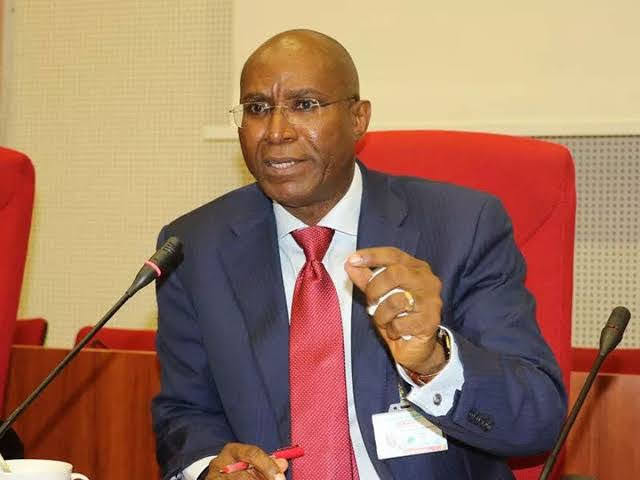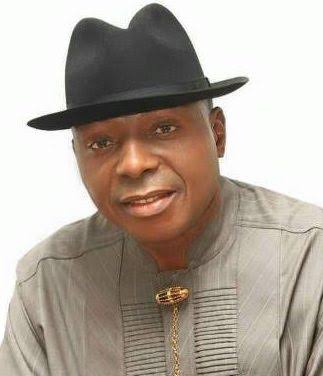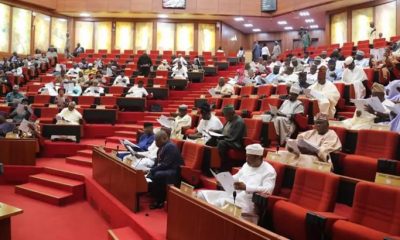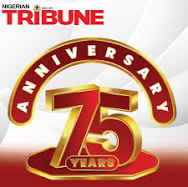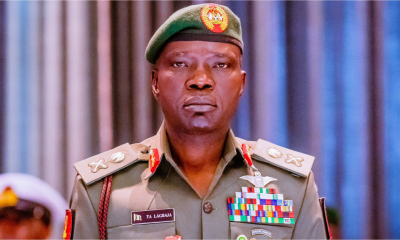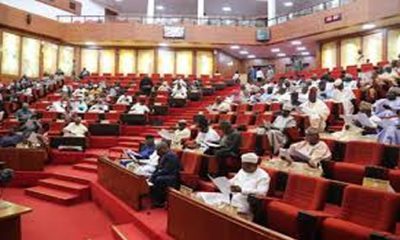Opinion
Nigerian Senate on bended knees

By Casmir Igbokwe
In a recent picture that went viral on the social media, the senator representing Delta South in the Senate, James Manager, was seen kneeling down fully before ex-governor James Ibori of Delta State. The senator had paid a courtesy visit to Ibori with drinks. But what he was asking for in this humble way was not very certain. All we saw was the picture of a man looking pitiable in his ankara outfit while Ibori looked at him like a headmaster interrogating a delinquent student. Though Manager and Ibori are almost the same age, an associate of the senator reportedly said the act was just a sign of respect in Urhobo culture.

According to him, “You don’t expect the senator to stand up to address Ibori.” To me, that picture is a perfect depiction of what the Nigerian Senate has become – pitiable.
The upper chamber’s most recent ignoble action was the clever rejection of electronic transmission of election results in the Electoral Act Amendment Bill 2021. Many Nigerians, including the Independent National Electoral Commission (INEC), had canvassed for the inclusion of this clause in the bill as a way to check rigging. INEC had actually experimented with this electronic transmission of results in some previous elections like the Edo governorship election of September 2020.
The 8th National Assembly made attempts to introduce it in the 2019 elections. But President Muhammadu Buhari thwarted the efforts. For three times in 2018, the President gave different excuses for not signing the bill into law. Among others, he said it was close to the 2019 elections and could create some confusion about the legislation that would govern the electoral process. This gave room for massive manipulation of the 2019 elections.
Now that the 2023 elections are fast approaching, riggers have started their plots again. The Senate claimed that not all parts of Nigeria are covered by the internet. The Senate Committee on INEC had recommended in Section 52(3) that INEC “may transmit results of elections by electronic means where and when practicable.” But an All Progressives Congress (APC) senator from Niger State, Sabi Abdullahi, amended the clause to read: “The Commission (INEC) may consider the electronic transmission of results, provided the national coverage is adjudged to be adequate and secure by the National Communications Commission (NCC) and approved by the National Assembly.” Fifty-two APC senators voted in support of this clause while 28, mainly of the Peoples Democratic Party (PDP), voted against. Twenty-eight others were absent.
The senators who voted against the amendment as presented by the committee on INEC hinged their decision on the NCC’s claim that only 43 per cent of the country has internet network coverage. But they forgot that bringing in the NCC and the Senate in this matter erodes the independence of the electoral umpire. It could also undermine the entire process, as members of the Senate who are the approving authority in the transmission of election result, are partisan politicians.
Senate President, Ahmad Lawan, tried to further justify the position of the red chamber. He said it was only trying to defend about half of the Nigerian voters whose votes might not be counted as a result of the immediate application of electronic transmission of results. He believes we have not reached the stage where we could deploy electronic transmission of results, saying at some point, our electoral process must deploy it.
Incidentally, INEC has said it has the capacity to transmit results electronically across the country. INEC National Commissioner in charge of Information and Voter Education, Festus Okoye, told a national daily that “The Joint Technical Committee constituted by the commission and the Nigerian Communications Commission and made of telecommunication operators met on March 9, 2018, and the consensus was that the requirements for the electronic transfer of results proposed by INEC is practicable.”
He said the commission had uploaded results from polling units in Southern Ijaw with its riverine and difficult terrain; from conflict areas and from all geographical zones. So, why is the Senate crying more than the bereaved? What are the APC lawmakers afraid of?
Already, many analysts have reminded the lawmakers that the world including Nigeria has gone digital. That is why the Universal Tertiary Matriculation Exam (UTME), phone registration, international passport, National Identity Number (NIN), and continuous voter registrations are all done electronically across Nigeria. And that is why people are encouraged to go digital in their banking transactions these days.
The other day, Aminu Malle, the Chief of Staff to the Deputy Speaker of the House of Representatives, Idris Wase, reportedly thanked northern members of the House for protecting and promoting the interest of the North in the Electoral Act and Petroleum Industry Bill as passed. He allegedly sent the congratulatory message on behalf of Wase and the Northern Caucus leader, Hon. Musa Sarki Adar, to the northern caucus through their WhatsApp forum.
Though Wase has denied writing the message, one wonders if electronic transmission of election results has become a regional and party thing. Does it mean that the North and the APC enjoy this analogue way of doing our elections? Is there something the region and the ruling party are gaining by manual counting and release of results? Could Buhari be protecting the interests of the North and his party when he refused to sign the bill previously?
There is more to this than meets the eye. We can’t continue to win our elections via rigging and expect our democracy to thrive. Some of us may be gaining it now. But ultimately, we will all be the losers.
Honestly speaking, we need to re-evaluate or restructure our legislature and the entire political system just as companies, individuals and countries do from time to time. We can start by making our legislature unicameral. After all, the Houses of Assembly of the 36 Nigerian states are not bicameral.
The legislators collect humongous salaries and allowances every month with little to show for it. Some of them are bench warmers. Some are perpetual absentees from plenary. That is why people are ready to kill and commit all manner of atrocities to win such positions.
It is this type of systemic injustice that has fuelled agitations for self-determination. The Federal Government is busy pursuing Yoruba Nation agitator, Sunday Igboho, and the leader of the Indigenous People of Biafra (IPOB), Mazi Nnamdi Kanu, while the Nigerian house is on fire. But for how long? Serious danger awaits any nation which continues to paper over the cracks in its electoral and political system. When the house collapses, not many people will escape the catastrophe.
Credit: Daily Sun





